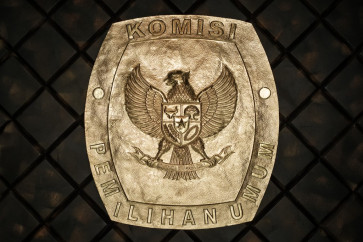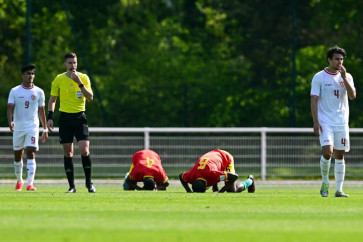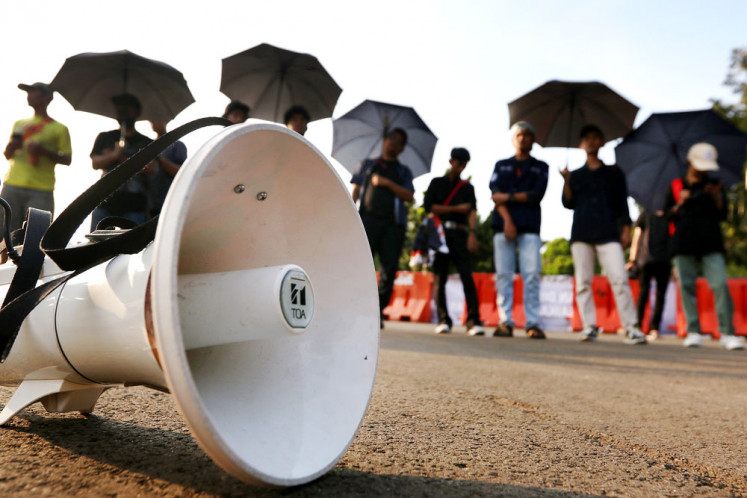Generals and the 'invention of tradition'
Retired General Wiranto, backed by hundreds of his colleagues, has in effect begged for impunity for human rights violations by claiming that their mission was to maintain the unitary state of Indonesia
Change Size

Retired General Wiranto, backed by hundreds of his colleagues, has in effect begged for impunity for human rights violations by claiming that their mission was to maintain the unitary state of Indonesia.
Retired or not, the generals basically perceive their job as a sacred mission bestowed upon those ready to sacrifice themselves for the sake of the nation. Hence, it is being used to relieve them from any charge of abuse. It is a key legacy of a politicized Army nurtured during the New Order, still vividly alive today.
Wiranto, deeply worried about state human rights commission Komnas HAM's investigation of past atrocities, has persuaded Defense Minister Juwono Sudarsono to resist Komnas and ask the generals not to respond to Komnas' calls. But the military chief said it is no longer the Army's business, leaving them to respond as individual citizens. Now, some 600 generals have urged Komnas to stop its investigation while arguing, like Juwono, that Komnas' calls are unconstitutional.
One wonders why the retired officers should behave as a quasi-political party: mobilizing friends and comrades, seeking ministerial support and exercising pressure. A generation of officers, whose careers grew during the New Order era, is united to defend younger colleagues on issues -- human rights cases -- they themselves never had to deal with. They may have some knowledge about the cases, but are totally unfamiliar with the concept of human rights since their views are inevitably biased by the New Order political culture.
Wiranto, for example, turned the tables when he denied rights violations and asked "what about my human rights?" -- thus, misinterpreting the universal principle at issue, which is about the state's actions against unarmed populations, not individual citizens vis a vis fellow citizens.
The case also illustrates how the legacy of past abuses has seriously affected them -- hence, some are aspiring to be president.
For, it is not the first time they sought political intervention. In late 1999, as East Timor moved toward independence, Wiranto reportedly approached Xanana Gusmao and urged him to help prevent an international tribunal from coming into being. They succeeded and most of those indicted for the 1999 violence were since promoted and all were acquitted.
Meanwhile, it is important to note that the meeting of hundreds of retired generals, the first of its kind in years, which included many allegedly involved in various past abuses, claimed that they could not be blamed since they were carrying out the state's mission to maintain the integrity of the unitary state (NKRI).
This pretext has too often been used; it's a motto, if you like, to justify violent incidents involving civilians. It means that the mission should be accomplished at all costs. As the nature of the mission was made sacrosanct, it became politically acceptable and practically convenient for the soldiers to ignore the rights of locals caught in conflict situations.
Any close observer of the wars in East Timor and Aceh could testify that clashes resulting in Army casualties were usually followed by heavy-handed retaliation as collective punishment for villages allegedly supporting rebels. It is a common trap in guerrilla warfare. Army units could also arbitrarily attack a community of militants, badly armed believers, as seemed to have happened in the 1989 Talangsari case.
But, seen from the center, the operation must be effective and the risk taken since the rebellion must be crushed. The nature of the doctrine was such that the mission's very acronym -- "NKRI" (the unitary state) -- became a legitimizing mantra.
Indonesian politicians are fond of mantras. We used to have a never-ending "revolution" to justify mass mobilizations for state purposes. Later, we saw the New Order imposing its own version of state philosophy of Pancasila in order to strengthen state hegemony. Both claimed these symbols and values to be part of continuity with the past, and used them as mantras.
Abdurrahman "Gus Dur" Wahid is doing the same these days. Facing internal conflict in his PKB political party, he said he left "Kyai Langitan", a group of elderly men he claimed to have instructed him to run for president in 2004, and turned to five grand Kyais.
Traditional symbols are used, revived, even recreated to face new challenges. The historian Erich Hobsbawm considers such things crucial and coined the term "the invention of tradition".
Soeharto and his generals, too, sought continuity by inventing their style of "tradition". The "NKRI" mantra, however, is a concept corrupted from the idea of unity as conceptualized when the nation fought for independence.
We seem to forget that our Founding Fathers Sukarno and Muhammad Hatta, and the generations of the 1930s to 1960s, consistently spoke of "persatoean" (unity) rather than "kesatuan" (indivisible unity). The latter, the "K" of NKRI, seems a militarized version that refers to the meaning of "unit" in the Army's term. Let's recall: even in the aftermath of the devastating tsunami and civil war in Aceh, the key slogan in Meulaboh read: "We love peace, but above all, we love unity".
The New Order's semantic transformation has been taken for granted for too long, and in doing so, we tend to forget that it emphasizes the militarized and centralized unity at the expense of diversity and regional interests.
To exploit the unitary concept as a political mantra regardless of the local situation not only risks greater resentment and greater human costs when it comes to retaliation, but could in the long run threaten the very integrity of the state the military wants to maintain. Here the Aceh rebellion (1976-2005) is a case in point. Muhammad Hatta, pointing to such potential, warned us that "persatoean" must not turn into "persatean" (bloodbath).
The author is a journalist.









